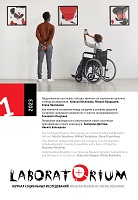Продолженное настоящее: капсулы времени как социальная практика и метод исследования
The Continued Present: Time Capsules as a Social Practice and Research Method
Author(s): Natalia Veselkova, Mikhail Vandyshev, Elena PryamikovaSubject(s): Methodology and research technology, Sociology of Culture
Published by: Центр независимых социологических исследований (ЦНСИ)
Keywords: Small Towns; Temporal Regime; Modernity; Soviet Practices; Multiscalarity; World Expos; Youth;
Summary/Abstract: This article considers the sociocultural practice of “time capsules” (TCs) in the context of three approaches. The theories of social time emphasize the modern nature of this practice and highlight the stages of the creation and opening of capsules, often tied to ritualized points—certain dates and events. The theory of communication stresses particulars of the messages, their senders and addressees, as well as aspects of communication breakdowns. Multiscalar analysis reveals various spatial and temporal scales used in the practice of TCs, as well as possibilities for their intersection. TCs differ with respect to the balance of future/present, positive/negative, laudatory/critical, serious/ ironic, and formal/informal; over time and depending on the type of capsule, this balance may change. In the second part of the article we present the time capsule as the our method of empirical research. During group discussions among high school and college students in eight small cities in the Ural region, we asked the participants to write a message for those who will live there 100 years later. This experiment revealed elements of isomorphism of our participants’ messages with real TCs as well as differences between them. For instance, we discovered that adolescents are mostly focused on the present. We analyzed their views of the future using schemes we adapted from Niklas Luhmann. The problems of urban life served as the basis for polarization of the written messages between “abandon” and “safeguard” as two basic scenarios for posterity. In conclusion, we discuss the heuristic potential of the TC method and approach as a whole.
Journal: Laboratorium. Журнал социальных исследований
- Issue Year: 15/2023
- Issue No: 1
- Page Range: 4-32
- Page Count: 29
- Language: Russian

